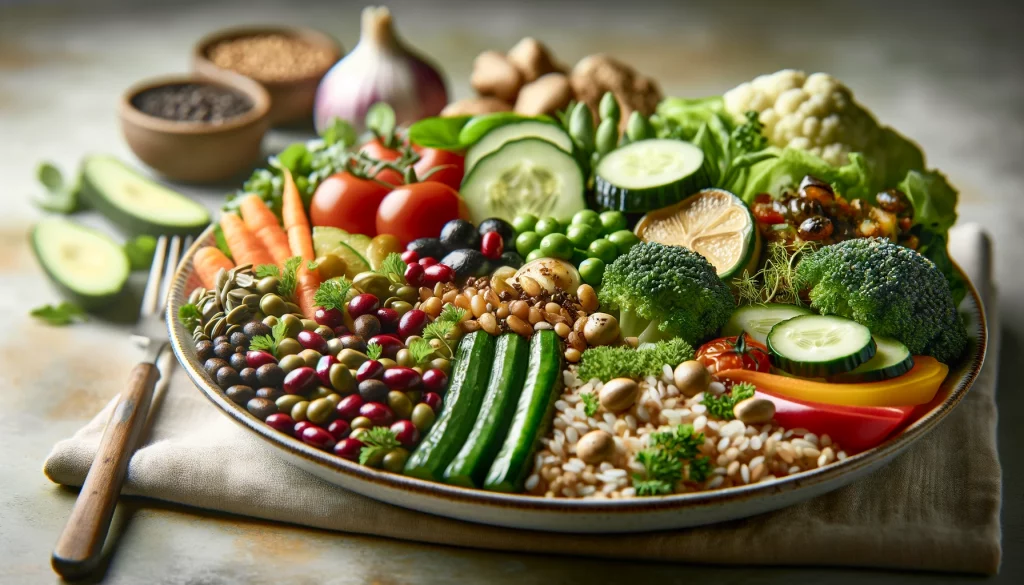Plant-based living is an approach to eating and life that prioritizes foods derived from plants. This lifestyle is not just about choosing salads over steaks but encompasses a wide array of delicious and nutritious foods that nourish the body and soul. A plant-based diet includes fruits, vegetables, nuts, seeds, oils, whole grains, legumes, and beans. It’s a flexible eating style that allows individuals to benefit from the plethora of nutrients found in plant foods, without necessarily eliminating animal products entirely. However, the focus is to significantly increase the proportion of plant-derived ingredients in one’s diet.
Table of Contents
Health Benefits Galore
The shift towards a plant-based diet has been shown to offer numerous health benefits. A significant body of research highlights the potential of plant-based diets to lower the risk of chronic diseases such as heart disease, hypertension, type 2 diabetes, and certain types of cancer. This is largely attributed to the diet’s high content of fiber, vitamins, minerals, and antioxidants, which contribute to heart health, improved blood pressure, better sugar levels, and enhanced gut health.
Plant-based diets excel in the realm of weight management. High fiber content in fruits, vegetables, and whole grains can lead to a feeling of fullness for longer periods, helping to reduce overall calorie intake. Moreover, plant-based diets are typically lower in saturated fats and calories, further supporting weight management efforts.
Environmental Impact
The environmental implications of plant-based eating are profound. Agriculture, particularly livestock farming, is a significant contributor to greenhouse gas emissions, deforestation, and water use. By opting for plant-based foods, individuals can play a role in reducing the demand for animal agriculture, thus decreasing their carbon footprint. The production of plant-based foods generally requires less water and land and generates fewer greenhouse gases, making it a more sustainable option for feeding the global population.

Making the Transition
Transitioning to a plant-based diet is a journey that doesn’t have to be overwhelming. Begin by incorporating more plant-based meals into your routine, aiming to fill half your plate with vegetables at every meal. Explore diverse cuisines that naturally emphasize plant-based ingredients, such as Mediterranean or Asian. Get creative with beans, lentils, and tofu to discover satisfying and protein-rich meals. Remember, the transition doesn’t have to be all or nothing; even small changes can have significant health and environmental benefits.
Debunking Myths
One common myth is that plant-based diets are deficient in protein. However, many plant foods are rich in protein, such as quinoa, legumes, nuts, and seeds. Another myth is that plant-based diets are expensive. While some specialty vegan products can be costly, basic plant-based ingredients like grains, beans, and seasonal vegetables are often less expensive than meat and dairy products. Lastly, the variety in a plant-based diet can be as broad and exciting as any other diet, with endless possibilities for creativity and flavor.
Culinary Exploration and Recipes
Exploring plant-based cuisine opens up a world of culinary creativity. From hearty vegan chili to creamy avocado pasta, the possibilities are endless. Start by veganizing familiar dishes, such as using lentils in place of ground meat for tacos or spaghetti Bolognese. Explore plant-based milks and cheeses, which can be delicious in smoothies, coffee, and baking. Don’t forget to include a rainbow of vegetables and fruits to ensure you’re getting a wide range of nutrients and flavors.

Community and Support
Embarking on a plant-based journey can be more enjoyable with support. Join online communities, follow plant-based bloggers or chefs, and connect with local vegetarian or vegan groups. Sharing experiences, recipes, and tips can provide motivation and inspiration. Additionally, many cities now boast an array of plant-based restaurants and cafes, offering the chance to explore new dishes and flavors.
Conclusion
Adopting a plant-based lifestyle is a pathway to improved health, environmental sustainability, and ethical living. It’s about making choices that align with your values and goals, whether that’s improving your health, minimizing your environmental impact, or supporting animal welfare. With each plant-based meal, you contribute to a more sustainable and compassionate world, while discovering the joys and benefits of nourishing your body with the best nature has to offer.
This journey towards plant-based living is not just a diet but a continuous exploration of food, health, and environmental stewardship. It’s an invitation to experiment, learn, and grow, embracing the abundance and variety that plant-based living brings to the table.







Leave a Reply